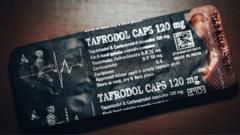The crackdown targets Aveo Pharmaceuticals, pinpointing the harmful exportation of opioid combinations fueling addiction.
India Acts Against Opioid Exports Linked to West African Crisis

India Acts Against Opioid Exports Linked to West African Crisis
Indian authorities ban two opioids amid public health concerns in West Africa following a BBC investigation.
In a decisive move, Indian authorities have implemented a ban on two highly addictive opioids, responding to alarming findings from a BBC investigation that spotlighted the drugs' role in exacerbating a public health crisis in West Africa. The announcement, executed by Dr. Rajeev Singh Raghuvanshi, the Drugs Controller General of India, indicated the revocation of the permission for manufacturing and exporting these substances.
The investigation uncovered that Mumbai-based Aveo Pharmaceuticals had been unlawfully exporting a hazardous mix of tapentadol, a potent opioid, and carisoprodol, a muscle relaxant notorious for its addictive properties. Countries such as Ghana, Nigeria, and Cote D'Ivoire were identified as hot spots for the distribution of these drugs. Following this revelation, India's Food and Drug Administration (FDA) conducted a raid on Aveo's Mumbai facility and confiscated its entire product stock.
The circular released by Dr. Raghuvanshi referenced the BBC investigation as a pivotal factor in banning all combinations of tapentadol and carisoprodol, citing concerns over the drugs' potential for abuse and their detrimental effects on public health. The drugs, known to induce severe withdrawal symptoms, such as anxiety and hallucinations, are especially perilous as their combination is not sanctioned for use worldwide due to the risks of respiratory failure and seizures.
Despite the health hazards, the inexpensive nature of these opioids has led to their burgeoning popularity as street drugs across several West African nations. Public export data reveals that Aveo Pharmaceuticals, along with its associate Westfin International, has dispatched millions of these tablets to West Africa, contributing to the growing opioid crisis in the region.
Nigeria, home to a staggering population of 225 million, stands out as the largest consumer of these opioids, with approximately four million citizens estimated to battle some form of opioid addiction, as reported by the National Bureau of Statistics. The BBC's investigation further illustrated the perilous landscape by deploying an undercover operative to embed within Aveo's operations, capturing footage of a director endorsing the very products devastating communities in Africa.
The director, Vinod Sharma, was recorded acknowledging the extreme harmfulness of the drug cocktail while casually discussing its recreational usage among the youth in Nigeria. Despite failing to provide commentary following the initial investigation, India's FDA has committed to pursuing legal actions against Aveo and ensuring stringent inspections to curtail the illicit supply of these harmful substances.
The agency emphasized its readiness to confront individuals engaging in illegal operations that could tarnish India's reputation in the global pharmaceutical landscape. The situation remains under close scrutiny as authorities endeavor to address the opioid plight both locally and abroad.


















